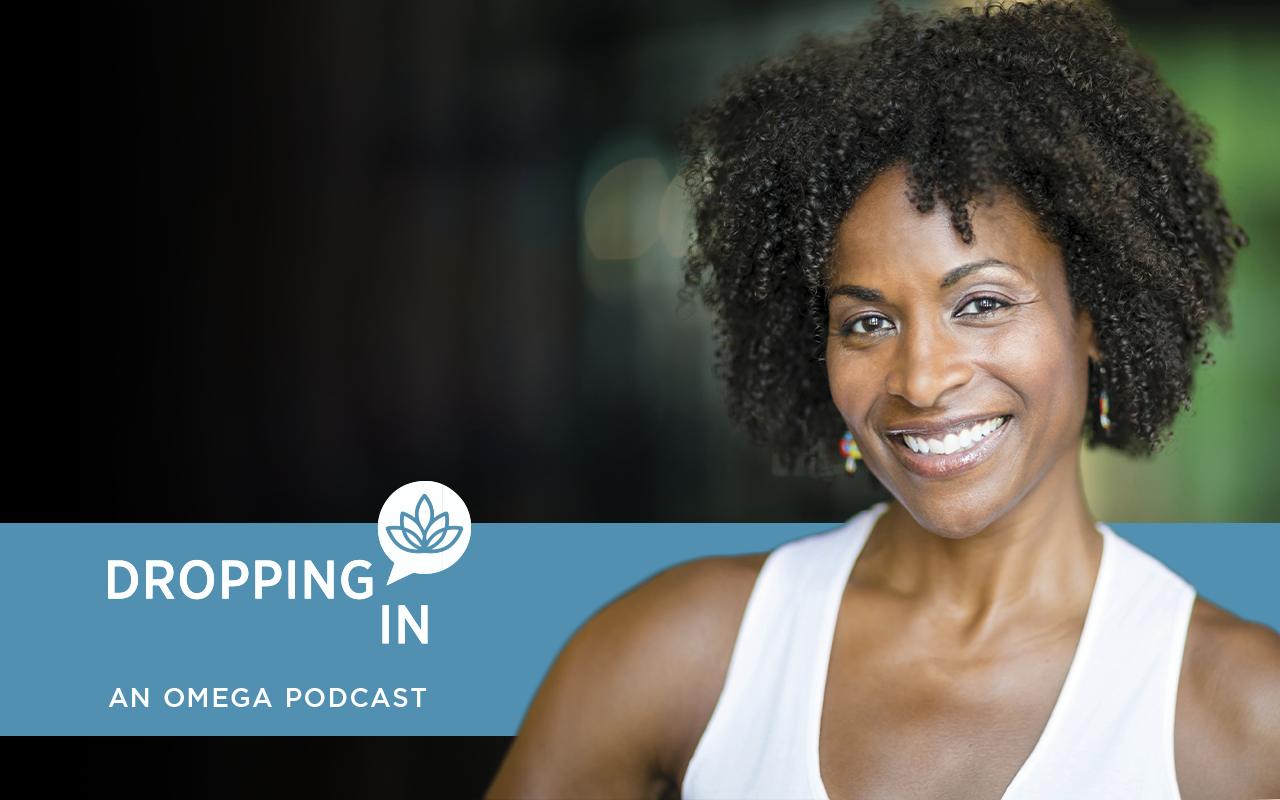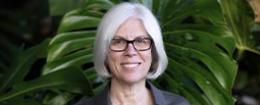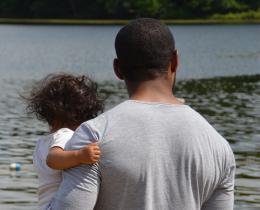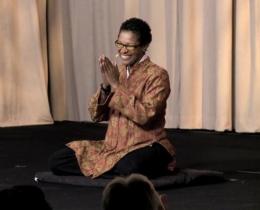Cali Alpert:
Welcome to Dropping In from Omega Institute, a podcast that explores the many ways to awaken the best in the human spirit. I'm Cali Alpert, dropping in today, Leslie Salmon Jones. Leslie is a professional dancer, wellness coach, certified holistic personal trainer and cofounder of Afro Flow Yoga, an embodied practice that infuses dance movements of the African diaspora with live music and yoga, Afro Flow Yoga offers in-person and virtual classes, workshops, retreats, and teacher training programs to build community cultivate activism, and offer racial and trauma healing programs. As well as programs for marginalized women and youth, including indigenous communities in Northern Canada. Welcome Leslie, thank you for dropping in today. It's so good to see you.
Leslie Salmon Jones:
Thank you Cali, it's an honor to be here.
Cali Alpert:
So I want to start by telling you the first time I saw a video of you on the Omega website, it was of you and your husband, Jeff, who's your multi-instrumentalist and cofounder of Afro Flow Yoga. I saw you on a video on Omega's website and I was so taken watching you and I felt like I was watching a pure embodiment of joy. And then I was wondering what did she eat for breakfast. And I'm just wondering what I was witnessing, watching you dance. And what you were feeling.
Leslie Salmon Jones:
Wow. Thank you for sharing that. That's really, that brings me joy. Wow, that's such a great question. I would just say that, I have a sense of freedom when I'm dancing. I've been dancing since I was the little girl and it really brings me to a place of home in my heart. And then of course, with the accompaniment of Jeff and all his instruments, it just unleashes so much freedom within me. And it's also been a part of my healing journey. So it connects me to that place of deep healing.
Cali Alpert:
I want to hear more about your healing journey. First, I'd like to hear a little, a bit more detail about Afro Flow Yoga and what inspired it. And also what it's like to work with your husband.
Leslie Salmon Jones:
Oh. Okay.
Cali Alpert:
It's something people either really aspire to, or really don't aspire to. And doesn't seem to be a lot of shades of gray in between.
Leslie Salmon Jones:
Absolutely. It's definitely been a journey and an organic journey. Because I didn't set out thinking about, oh, what should I create? But it really came out of that, the deep healing journey. In 2007, Jeff and I traveled throughout west Africa after three of our grandparents, two of our parents actually had passed away. We had been married for 11 years and my family background was born in Toronto, Canada and comes from a Jamaican ancestry. Three of my grandparents were Jamaican and the only grandparent I knew was my grandmother, Violet Bell, who was Scottish, Irish, Canadian. And Jeff on the other hand, he comes from a lineage of African Americans who can trace all the way back to an enslaved African girl. She came in at the age of the eight, she was brought to this land. And so because the US have inventory, the enslaved Africans were inventory, he can trace back, they have a family tree, they can name all the people, it's really quite [crosstalk 00:04:02], they have a family trust, their family reunions have 200 people. It's amazing.
Leslie Salmon Jones:
And because my grandparents, the three of my grandparents on the Jamaican side, there was no real history there that we knew of. But then on the Scottish Irish side, we had a book, so thick dating back to Dundee, Scotland, and like the early 1800s and the names, and. So there was this quest to really find out more. And so we went through West Africa, we went to Côte d'Ivoire, Ghana, Togo and Benin. And we knew it was important to actually go to the places where our ancestors were most likely taken from. And those were the slave dungeons. They call them slave castles, but really they're dungeons. And to stand on that ground was really answering the prayers of our ancestors.
Leslie Salmon Jones:
So within that, that ignited within my cells, just that deep sense of returning home. And also some of the trauma did kick up some of the legacies of trauma. So after that journey, I ended up going on two year journey of healing, deep healing. And a lot of it had to do with healing my womb. I'm an empathetic person and when I stood in the female slave dungeons, I could actually feel the contraction in my body. And then it ended up actually manifesting physically in my womb. And I had some precancer cells and when I got back and I ended up, instead of running away from it, I went deep into like what that meant and I just knew it was connected to the trauma. I was in prayer and meditation, and I had a vision; Afro Flow Yoga just came through.
Leslie Salmon Jones:
And the description of Afro Flow, it all just came spirit was channeling talking to me and I was listening. I was finally at a place where I could listen. And then I very confidently because it clearly wasn't coming from me. I very confidently listened to that deep voice and taught in Sedona, Arizona. So Afro Flow Yoga was actually born on the vortexes, during a full moon. And it was this amazing spontaneous combustion of joy. And somehow some drummers came out of the woodwork and it was just the most incredible experience. My mother was there so she saw her witnessed, I call it, her grandchild was born and my sister was like. So there was a whole wifeing of Afro Flow Yoga. And then Jack of course, after we had been married for 12 years, at that time, he was a bass player and he said, "You have to have live music at every offering. You just need the live music."
Leslie Salmon Jones:
I said, "That would be so fantastic." But who's going to play the live music for me. And he said, "I will play the live music for you." And of course he started pulling out as... If you get to know, Jeff you'll realize that he's like so incredibly talented on so many levels. And he pulled out some bongos and some congas and djembe. And then when that we got from Africa and he started playing and unbeknownst to me, he had played when he was younger. And then all of a sudden I have this new husband who is now we're really, this is now our child. We're doing this together and it was all stream of consciousness.
Cali Alpert:
I want to go back if I may, because it's so important to what happened when you were there at those slave dungeons. If I may.
Leslie Salmon Jones:
Yes, please do.
Cali Alpert:
Was the reaction that you had and the trauma got awakened in you, something that you were surprised by? Or did you have any sense that it wouldn't be a huge surprise that you'd have a very deep experience there. Did what happened surprise you?
Leslie Salmon Jones:
I wouldn't say it surprised me, but I would say maybe the visceral reactions to, I knew of the slave dungeons, I knew that many people would go and visit those real pilgrimage to go there. So I was prepared in that way, that's why we went, we really wanted to go there. I was surprised, I would say by the sensations that I felt, because going, you can't really describe it, but when you go into the female slave dungeon, for example, you can still feel the presence like the scent, the smell. You feel the presence of the people it's so deep and it's something that can't be washed down. And so I think that's what really struck me. I the smell of it and it just takes you right there where imagining so many women and then to see, like there was no air. There were little tiny holes and that those holes weren't for people to be able to breathe. It was more so that the people who captured them could spy on them and make sure that they weren't trying to get out.
Leslie Salmon Jones:
So that was really shocking, like the cruelty and how people actually survived. Because what we learned was that, before people were put in the slave dungeons, they were actually had a two month journey walking from the center of the country, to the coast. And I don't know if I could survive that. Right? And so you just, and you're chained and you're not eating and you're not it's a lot of people passed away just from that journey. And then you're in the slave dungeons for two months, and what I was really surprised about was more so that people, whether it was like Scottish or British, or whoever was in power at the time, they had PhDs to figure out how to dehumanize people. And that's what was more so mind blowing. That, the level of depth and strategy to actually break people down. And that's when I made the connection well, all the work I've been doing with marginalized communities, it all made sense because of course, I mean, those are deep, that's 400 years of conditioning of dehumanization.
Cali Alpert:
To what degree is that able to be unpacked in any true way? As much as many people try.
Leslie Salmon Jones:
Yeah.
Cali Alpert:
So to that point, your mission with Afro Flow Yoga is to inspire unity and love and harmony and interconnection while it's striving for social justice and equity. Can you talk about how this practice can support people in the name of a more inclusive, an equitable world? A loaded question. I know.
Leslie Salmon Jones:
Yeah, yeah, yeah. Yeah. Well, for one thing, I think it's the work that we've done on ourselves. Like, so when I come into this practice, I've done a lot of work on healing, the oppressed and the oppressor within, the enslaved and the master within. So when people are coming in and then I come from a family that is so multigenerational, multicultural, multi, multi, multi, multi. And Jeff as well, I mean, just our exposure to that. So when people come in, they're loved, we're not looking at the color of your skin, we're not looking at the size of your body, we're not looking at any of that, just your soul. So that's one thing that feeling of welcome, being welcomed. And then the other thing is, is that it's not a heady practice. And so the ideas just to come into your heart, come into your breath. And I think there's so much spaciousness and potential in the heart and the head we get so limited in our thoughts, in our head, in our perceptions, in our conditioning.
Leslie Salmon Jones:
So the invitation is really to come into the heart and then also in a non-judgmental environment. So we invite people when they come in to really practice self care. And so it's not about coming in and being competitive and a lot of people come and there's some fear there because they never dance
Cali Alpert:
Self consciousness.
Leslie Salmon Jones:
Yeah. They've never danced. In their minds, it's like, they're not a dancer or they're not a [yogea 00:13:18]. The invitation is really be you and take your time and practice non-judgment not only of yourself but of others. And so once we set that environment, there's a freedom that comes through and acceptance and healing. A lot of people come and they say, they came because their hearts needed healing. And I'd say that is probably one of the main things that people speak of. Yeah.
Cali Alpert:
I'd love to talk about the concept of embodiment. And this is something I've been thinking about a lot, even in researching before this conversation with you today. The idea that there is such a disassociation would be the word, I guess when people are experiencing any sort of trauma, even if they're not conscious of it. Where there's a separation between what happens in your head and what happens in your body. Is that a common condition and one that maybe we need to pay a little bit more attention to before we get to the part where we figure out how to solve it with more embodiment practices?
Leslie Salmon Jones:
Yeah, absolutely. Of course, we have the parasympathetic and the sympathetic system and the nervous system and the natural fight or flight or freeze or fall. And so when we're not aware of that, we just naturally go into our reaction. And so the disconnect as well, I think has a lot to do with colonization. And the disconnect to the earth and the conquering and dividing. Because in studying a lot of indigenous and African cultures and cultures around the world. And there are ways of appealing more natural, where you might go into a movement or you might go into singing. Those rituals are there for that reason to really support people. But now that those rituals have been taken away in many forms, then we just have that fight or flight. Those are the tools that we have and it just happens.
Cali Alpert:
Doesn't leave us with a lot.
Leslie Salmon Jones:
Right. Exactly. Exactly.
Cali Alpert:
So there's been so much loss, especially around COVID individually, collectively, and yet loss is always a part of human existence. I'd love to hear you speak to that. And the idea of trauma, the work perhaps that you've done with Afro Flow Yoga and individually, and just anything that you would advise for people that are experiencing this kind of loss, this kind of challenge.
Leslie Salmon Jones:
Yeah. Thank you. It really has been such a time of loss and deep grief. And in my experience working, particularly with [inaudible 00:16:32] who there's a beautiful grief ritual. One of the things that I've learned from him is that the practices of grief and our rituals have been taken away from us. And it's such a part of life as you had mentioned, Cali it's part of nature, loss. And I have been experiencing some grief, the loss of my brother and a couple good friends. And I've been really thinking about this idea of the impermanence and nature of impermanence. And one of the things that I find is really helpful in dealing with loss is we understand it is that, nature is such a great teacher.
Leslie Salmon Jones:
And so I've been spending a lot of time in my garden. So when my brother passed my husband and I, we ended up planting three trees in honor of his children. And being in nature, just going into the dirt and pulling up the roots, the old roots that are no longer serving. And then to be able to really nourish the soil and then to plant something new is such a wonderful teacher and a reminder of, not only the impermanent nature, but the beautiful cycle, the rhythm of nature and of life and of loss and composting what is old into something beautiful and new. And so it's a great reminder when you experience loss and you're grieving deeply, how much love you have also experienced. It's a great reminder of that. Wow, to be able to grieve is to be able to love and vice versa.
Cali Alpert:
Do you have suggestions for people that are grieving in a myriad of different ways? Because the bottom line is grief is grief. Right?
Leslie Salmon Jones:
Yeah. And it takes time. I think in the society, oftentimes when they lose a loved on we rush back or we're people say, okay, you have three days and wanting to grief and then just get back to work. And that's not how grief works. It can be a lifetime, it can be a process. And sometimes it's just learning to live with that grief. And, and it depends like on your practice and on your faith. So what was really helpful for me was connecting to my ancestry. And as my father passed away, it's like, I have a new relationship with him now, more expansive relationship actually. And through his stories and legacy carries through me. And to me that gives my dad life and our relationship and new life. So I recommend for people just to be really it's tender time.
Leslie Salmon Jones:
And to encourage you find practices that perhaps are helpful, whether it's being sitting in quiet or I created alters. If having a beautiful little memorial for your loved one is helpful. And the tendency might be to suppress the feelings of deep loss, but when you can go into it and actually allow it to come up. The other thing I did when my dad passed way, is I danced on his behalf, I went to started going to Afro Haitian dance classes. The drums connected me to the rhythm of my heart and to my dad. And because he couldn't dance on the physical, I could certainly dance in his honor. So that was really healing.
Cali Alpert:
That's so beautiful, it's so touching to hear that. Let's talk about the power of rhythms. They're such a primal thing. Their origins are extremely ancient and fundamental. What do rhythms do for people?
Leslie Salmon Jones:
Yeah. So there's so many different rhythms. I always think of the drum as the heartbeat. And so we have our own natural rhythms within, and that drum connects to our natural heartbeat. And there's different vibrations, different vibrations connect to different chakras. And as my husband is playing, for example, he might play a rhythm to bring a little calm to people, a slower vibration that helps actually the nervous system settle a little bit more regulates your breath. Oftentimes when we're working with kids, for example, he literally will start really playing the drums and it matches their energy. And then once again, it's a communication, it's a way of communicating. And then when you look at the rhythms of nature, you look at the solstices and the different when the dark times and to go with when it's a little lighter outside. I really believe that's how ancient times we were more regulated by the rhythms and we lost our way.
Leslie Salmon Jones:
So I feel like we're coming back into that awareness of, oh, it's a solstice coming up and there's certain rituals we can do around that time. And then there's a rhythm of the water. Like if you think about the ocean and the inhalation and the exhalation, the rhythm of the tide that comes into the shores, like the breath and then the exhalation we release and let go. And so syncing up and knowing that we are water, we are all part of that. And to find that natural rhythm, and sometimes it's like coming into the stillness when we can come into the stillness again, and start practicing of deep listening and resynching. Like the animals they know when things are happening and we all have that instinct within. But when we're running out of the pace anxiety where it doesn't really encourage those natural rhythms, that's when we can feel separated from the rhythms. Yeah.
Cali Alpert:
I think everybody should have some version of a drummer, a percussive instrument in their house.
Leslie Salmon Jones:
Well, I would say if you don't, you have it in your body, you have it in your heart.
Cali Alpert:
Mm-hmm (affirmative).
Leslie Salmon Jones:
So we all have it.
Cali Alpert:
That's your beating drum right there.
Leslie Salmon Jones:
That's your beating drum right there. And just even placing your hand on your heart and just feeling that rhythm and tuning in can be a really powerful practice.
Cali Alpert:
So what does it mean exactly to be in one's body? It's a term that gets used a lot and I'm not sure that people know what it really means. And again, circling back to what I said at the beginning of this conversation, watching you and watching you conduct your classes, looks like what I would imagine is the embodiment or being in one's body or what you're encouraging people to do. So what does it mean for people that haven't experienced that?
Leslie Salmon Jones:
That is such a big, great question, Cali. Well, I would say that, and I'm going to speak for myself from my experience, because everyone has a different experience. So for me, what might feel embodied might be different from you. Certainly for me, the embodiment is the awakening of the consciousness within, it's the energy that can get, it can get stuck oftentimes. And it's the awareness of that, it's moving through a relationship maybe with pain. If you feel certain pain bodies or certain parts of yourself, those are the signals. It's easy to numb them out or to go deep into them. And the more we can have that relationship with the body and understanding what stories the body is carrying, how to work.
Leslie Salmon Jones:
We're not really raised to think about the body, we're not raised even to think about the earth so much. So these are all conditioning again. And I often think about the planet, and I think about the galaxies and I think about how the galaxies and the planets are always in motion and they're dancing, they're constantly in motion. And I have a friend who studied astrophysics and she was an astrophysicist and she studied the sound of planets. And each planet has its own sound. Each planet has its own song, the own vibration. So there's music and movement in the universe. And that's within us.
Cali Alpert:
Do you day to day feel like you're in your body most of the time, all of the time?
Leslie Salmon Jones:
So I'm aware Cali, when I am less in my body. And it feels what, how I can describe it is like, it feels a little sleepy today, or it's not quite as vibrant or awake. And so there are practices that I do to awaken the nervous system, the cells, to get the flow going. And so it's definitely a discipline and I feel much better like even preparing to talk to you. It's raining today and I felt like it was a little heavier and a little more sluggish. So I did my breathing exercises, opened my lungs and just moved and I just feel much more alive now.
Cali Alpert:
And I have the benefit of talking you on Zoom so I can see you as your very flexible shoulders are moving around and I'm sitting here hunched over the microphone thinking, oh, I better sit up a little bit straighter. How does one begin to become more aware of their relationship with their body?
Leslie Salmon Jones:
That's a wonderful question. I'd say that there are different points of entry. And I would say to be really truthful to yourself. And so, for example, if there's something in your physical body that is causing you pain, you might want to take some time to investigate what that is, because that's a signal. And what I mean by that is maybe slow down, maybe practice self care, go into that. So there's different parts of your body that might show up with different emotions. So for example, around the back the spine, it could be related to family issues. Maybe around the shoulder area could be related to your confidence. So there are certain things that show up to inform you, your information. And there's a wealth of knowledge inside, and it's really about practicing the listening, that inner ear.
Leslie Salmon Jones:
Same thing with your emotions. If you're experiencing a lot of anxiety, for example, that might be another point of entry, like getting to perhaps the root cause. What happens? What do you notice? How do you feel? Like are your hand sweaty? Does your heart race? And what are you doing as you're feeling that? Can you write it down perhaps? If you're someone to write. Can you notice in this moment, like I feel anxious when someone walks in the room? And so to notice, and then there's usually a route to that. Maybe it's a story from when you're a little, something happened to you when someone walked in the room and it was a traumatic thing that happened. And you can come back into that place and supposed to suppress it. You can actually maybe use it as an opportunity to heal that old story that's showing up now.
Cali Alpert:
I think it's so helpful just to hear you talking about the encouragement of just listening and remembering that your body has a voice. So you mentioned self-care, I know that you grew up knowing the importance of self-care from a young age, thanks to your mother. Right? What did you learn and were you able to implement it once you were all on your own? And not in her household. Was it as easy and whereas exposed to it as you were, when she was teaching it to you?
Leslie Salmon Jones:
Sure. And it was also my dad as well. So both my parents, we would often play tennis, we do a lot of group fun family activities together. I watched my mother and my dad both really work really hard. My mom, as a community activist, human rights activist. And my dad is a surgeon and high level stress oftentimes. And they both seem to be able to handle it really calmly, like rarely I rarely did they raise their voices. And they practiced self care with whether it was like eating. My mother, for example, would make my dad lunch, even she'd come home and she'd put his lunch in a paper bag for him to take to the hospital then his office. So it was like a ritual that my dad would make me oatmeal in the morning and we'd eat the oatmeal and, or my dad would take the stairs, just take the stairs. My mother in between her very busy, busy life would take me to the gym as a teenager. So we'd have our time together.
Leslie Salmon Jones:
So what I watched both of them do, and they're very highly, potentially highly stressed lives were really put self care at the forefront. And it wasn't an act of being selfish. It was an act of actually being able to manage and regulate. And so that's what I learned, and I would say the same thing for my siblings as well. That modeling really, really informs us all today.
Cali Alpert:
You've talked a lot about the idea of one's core. The physical core, the inner spiritual core, the core of the earth. Can you tie those together? They're separable in day to day life and the way they're presented. You work on your core when you're doing a yoga posture or a plank, or you're getting in touch with your inner essence, your emotional, spiritual core. But link them together, I sense there might be some link that even as I was researching, you popped in that I wanted to ask you about.
Leslie Salmon Jones:
Yeah. And when you say that, it's you take me back to, like, when I was really looking at that, and I'd say that was over a decade ago, like very two decades ago, I was really going into that. So I love that you're bringing me back to that because, it's all interconnected and how that question. And at that belief of the core actually keeps unfolding and it's like a tree. And I keep coming back to the tree, because the tree has like the layers, you have the core. And then you see all of the layers and all of the stories and it's like an onion. And that information is so powerful yet it keeps the tree balanced. It keeps the tree connected to the root system, which is so powerful without the root system, that tree would fall.
Leslie Salmon Jones:
Yet it keeps it so connected to the nourishment of the sunlight. And so I think about the layers of the core and, and so on my healing journey, I remember awakening to this, the physical core at a dance class. Now [inaudible 00:33:42] when I was training and my teacher would talk about that [inaudible 00:33:46] like, what the heck is she talking about? And then one day just, it was like an aha. It clicked, and then I found that place of balance. And then think about the emotions when I was really doing this work, I was challenged with the emotional body when I was doing the healing and was like, right? In my room was where I discovered that depth of pain and trauma and shame and all of those things that I pushed down into my core and thinking I would just continue on. And so that I'm layering, uncovering and getting to that essence, the true essence. And I feel like we could do that on all levels. And then yet to that place of in permanence and there is no separation. Yeah.
Cali Alpert:
You bring up the onion analogy and in my mind, I've started using the artichoke analogy of peeling back layers to get to the heart that's in the center. Do you think that there's an order that's advisable for people that are looking to be on this kind of a healing journey in terms of starting internally or starting externally. At omega, we talk a lot about where personal growth meets social change or social impact. And that both are inextricably tied to each other. And I'm wondering if you think there's an order in which it could should happen.
Leslie Salmon Jones:
Well, I would say that everyone's journey is completely different. And, I can advise people, but certainly the advice is to really, really be authentic to your truth and your journey. So something that happens outside externally might actually be an invitation to look internally. I'm extremely focused internally, as you can see. And I believe as within is without, there's the inner manifests of the external. However, everyone has a different level of consciousness, a different way of coming to things. But certainly I encourage that place of inward introspection. And even like, I've worked with a lot of organizations for example, and who want to do the work and bring more equity to their organization, to the world.
Leslie Salmon Jones:
And the tendency is to do the outward thing first. Like let's do our marketing. Let's put more people of color on our magazines or whatever it's. And, that always falls short because the internal work hasn't been done. So when we actually can do the internal work, we're then at a place of like really, really living it. We're really embodying what it is that we want to shift, because the shift happens first within. Yeah.
Cali Alpert:
And it's never mutually exclusive. Right? I mean, the universe is a pretty magical, amazing place where the person and the experience shows up and there's the mirror where you got to stare yourself in the eyes and go back inside and look at all those little places. Right? It's kind of magical how that Happens.
Leslie Salmon Jones:
It's magical. Yeah.
Cali Alpert:
Not always fun, but magical.
Leslie Salmon Jones:
Right. Yeah, exactly.
Cali Alpert:
So finally, I'd like to ask you three questions that I like to ask every guest who visits us on Dropping In. The first is I'd like to grant you one wish for our listeners, what would it be?
Leslie Salmon Jones:
One wish for our listeners. Well, I wish that you all feel healthy and safe and come to a place of deep love and interconnection. Magic. Yeah.
Cali Alpert:
What is something you wish for yourself?
Leslie Salmon Jones:
That I continue on the journey of unfolding and coming deeper and deeper into the heart and releasing any bondage is coming into liberation for myself and all.
Cali Alpert:
And finally, what is the most important offering you'd like our listeners to take away from our conversation today?
Leslie Salmon Jones:
I would say, just to continue to on your journey and to do that deep listening, and I'd love to be in touch. So feel free to reach out anytime. And however I can be of support and of service I am here.
Cali Alpert:
Well, I want to thank you so much for spending time with me today. And if people would like to learn more about you and your endeavors, where can they find you?
Leslie Salmon Jones:
Sure. You can find myself and my husband, Jeff, and our amazing team at www.afroflowyoga.com. And depending on the timing of this podcast, we will be in Costa Rica in the winter in 2022, leading some retreats. And we also have a training program that's for anyone to come in and to learn about community healing and the roots of yoga and Africa and your own journey, how you can connect to your ancestry and uncover and unfold your beauty and your light.
Cali Alpert:
And who doesn't want to do that?
Leslie Salmon Jones:
Right.
Cali Alpert:
Thank you so much. Leslie, such a joy to talk with you.
Leslie Salmon Jones:
Thank you. You as well, Cali it's an honor and I love Omega and I love the whole team over there. You're all doing such great work. It's an honor.
Cali Alpert:
Thanks for dropping in with Omega Institute. If you like, what you hear, tell your friends and leave us a review on Apple Podcasts. It helps new years find us. Dropping In is made possible in part by the support of Omega members. To learn more, visit eomega.org/membership and check out our many online learning opportunities, featuring your favorite teachers and thought leaders at eomega.org/onlinelearning. I'm Cali Alpert, producer and host of Dropping In the music and mix are by Scott Mueller. Thanks for dropping in.





